各种从句的英语表达
英语所有从句大全(1)
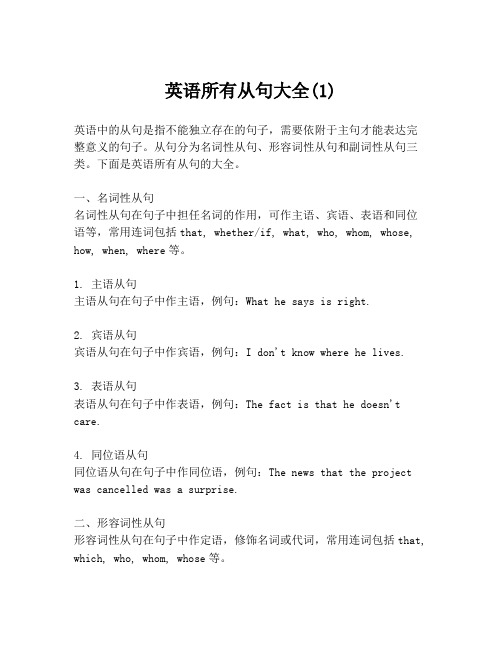
英语所有从句大全(1)英语中的从句是指不能独立存在的句子,需要依附于主句才能表达完整意义的句子。
从句分为名词性从句、形容词性从句和副词性从句三类。
下面是英语所有从句的大全。
一、名词性从句名词性从句在句子中担任名词的作用,可作主语、宾语、表语和同位语等,常用连词包括that, whether/if, what, who, whom, whose, how, when, where等。
1. 主语从句主语从句在句子中作主语,例句:What he says is right.2. 宾语从句宾语从句在句子中作宾语,例句:I don't know where he lives.3. 表语从句表语从句在句子中作表语,例句:The fact is that he doesn't care.4. 同位语从句同位语从句在句子中作同位语,例句:The news that the project was cancelled was a surprise.二、形容词性从句形容词性从句在句子中作定语,修饰名词或代词,常用连词包括that, which, who, whom, whose等。
1. 定语从句定语从句在句子中作定语,例句:A person who loves music will enjoy the concert.2. 条件从句条件从句在句子中作条件,一般用if, unless等连接词,例句:Unless you study hard, you won't pass the exam.三、副词性从句副词性从句在句子中作状语,修饰动词、形容词、副词等,常用连词包括that, if, whether, why, when, where, how, as, because等。
1. 时间状语从句时间状语从句在句子中作时间状语,例句:I will see you when I come back.2. 地点状语从句地点状语从句在句子中作地点状语,例句:He sat where there was shade.3. 原因状语从句原因状语从句在句子中表示原因,例句:He didn't go to work because he was sick.4. 目的状语从句目的状语从句在句子中表示目的,例句:I'm studying hard so that I can get good grades.5. 结果状语从句结果状语从句在句子中表示结果,例句:He is so clever that he can solve the problem.6. 让步状语从句让步状语从句在句子中表示让步,例句:Although he is poor, he is happy.7. 比较状语从句比较状语从句在句子中表示比较,例句:He is taller than I am.8. 方式状语从句方式状语从句在句子中表示方式,例句:He works as if he is the boss.9. 条件状语从句条件状语从句在句子中表示条件,例句:If you study hard, you will pass the exam.四、从句的语序和时态从句中的语序和时态要根据主句来变化。
英语三大从句类型总结
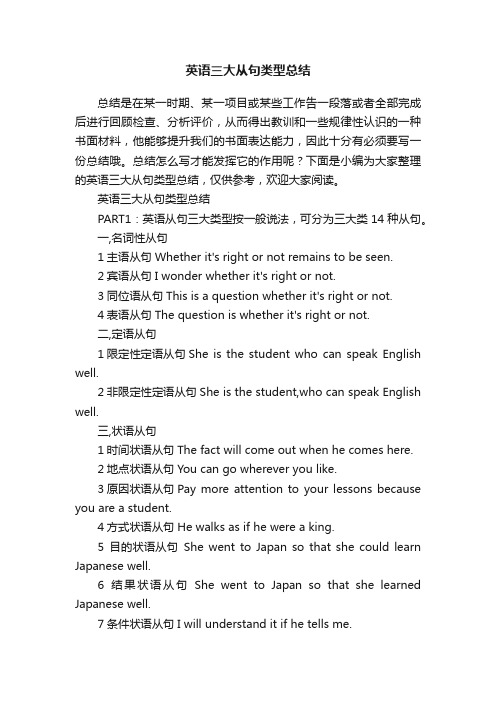
英语三大从句类型总结总结是在某一时期、某一项目或某些工作告一段落或者全部完成后进行回顾检查、分析评价,从而得出教训和一些规律性认识的一种书面材料,他能够提升我们的书面表达能力,因此十分有必须要写一份总结哦。
总结怎么写才能发挥它的作用呢?下面是小编为大家整理的英语三大从句类型总结,仅供参考,欢迎大家阅读。
英语三大从句类型总结PART1:英语从句三大类型按一般说法,可分为三大类14种从句。
一,名词性从句1主语从句Whether it's right or not remains to be seen.2宾语从句I wonder whether it's right or not.3同位语从句This is a question whether it's right or not.4表语从句The question is whether it's right or not.二,定语从句1限定性定语从句She is the student who can speak English well.2非限定性定语从句She is the student,who can speak English well.三,状语从句1时间状语从句The fact will come out when he comes here.2地点状语从句You can go wherever you like.3原因状语从句Pay more attention to your lessons because you are a student.4方式状语从句He walks as if he were a king.5目的状语从句She went to Japan so that she could learn Japanese well.6结果状语从句She went to Japan so that she learned Japanese well.7条件状语从句I will understand it if he tells me.8让步状语从句He knows a lot though he is little.PART2:经典名词性从句主语从句(subject clauses)在复合句中起主语作用的从句叫主语从句。
英语三大从句
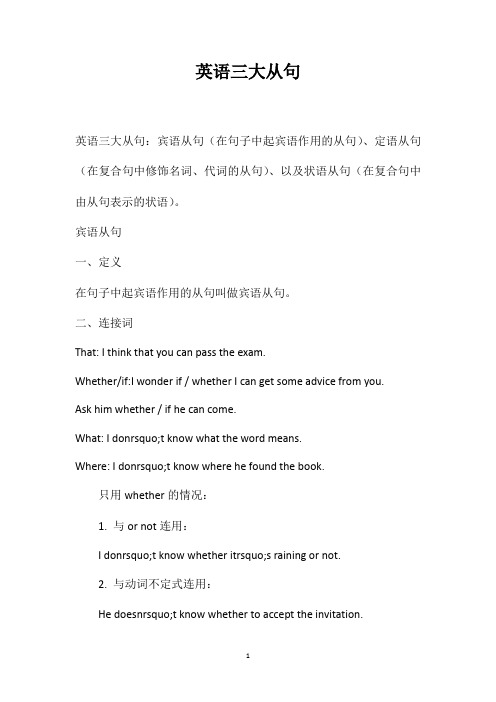
英语三大从句英语三大从句:宾语从句(在句子中起宾语作用的从句)、定语从句(在复合句中修饰名词、代词的从句)、以及状语从句(在复合句中由从句表示的状语)。
宾语从句一、定义在句子中起宾语作用的从句叫做宾语从句。
二、连接词That: I think that you can pass the exam.Whether/if:I wonder if / whether I can get some advice from you.Ask him whether / if he can come.What: I donrsquo;t know what the word means.Where: I donrsquo;t know where he found the book.只用whether的情况:1. 与or not连用:I donrsquo;t know whether itrsquo;s raining or not.2. 与动词不定式连用:He doesnrsquo;t know whether to accept the invitation.3. 连接词前有介词时:It depends on whether he is coming.三、时态1. 主句是一般现在时态,从句根据实际情况而定(各种时态均可)She wants to know what he has done for the exam.2.主句是一般过去时态,从句用相应的过去的时态。
1)She said that she was a student.2)She said that she would fly to Japan in a week.3)She said that she had finished her homework already.3. 如果宾语从句说的是客观真理、自然现象或事实时,这时宾语从句要用一般现在时态。
英语中六大从句用法总结
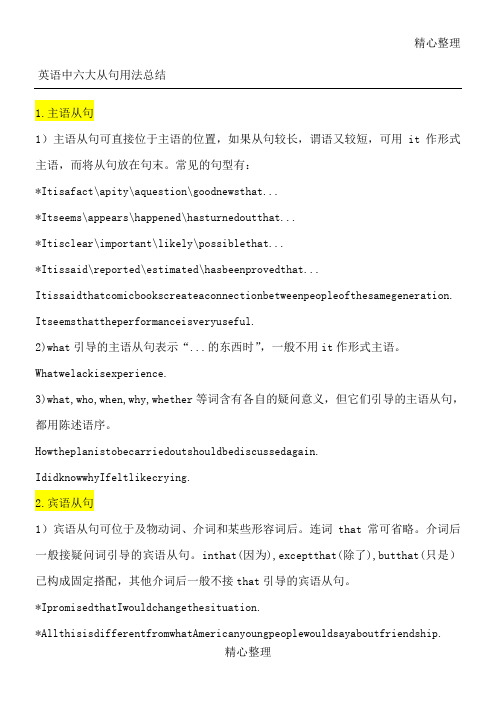
精心整理英语中六大从句用法总结1.主语从句1)主语从句可直接位于主语的位置,如果从句较长,谓语又较短,可用it作形式主语,而将从句放在句末。
常见的句型有:*Itisafact\apity\aquestion\goodnewsthat...1)宾语从句可位于及物动词、介词和某些形容词后。
连词that常可省略。
介词后一般接疑问词引导的宾语从句。
inthat(因为),exceptthat(除了),butthat(只是)已构成固定搭配,其他介词后一般不接that引导的宾语从句。
*IpromisedthatIwouldchangethesituation.*AllthisisdifferentfromwhatAmericanyoungpeoplewouldsayaboutfriendship.*Heiscertainthatwatchingsomuchtelevisionisnotgoodforchildren.*Thisarticleiswell-writtenexceptthatitisabittoolong.2)宾语从句后如有宾补,要用形式宾语it来代替,而把宾语从句移至宾补之后。
Hehasmadeitclearthathewouldnotchangehismind.3)在think,believe,suppose,expect等动词后的宾语从句中,如果谓语是否定的,名词的意义不同,也可用whether,who,when,where,what,why,how等引导。
常见的先行名词有fact,idea,belief,news,hope,conclusion,evidence,suggestion,order,problem, report,decision.有时由于谓语较短,将同位语从句位于谓语之后。
Shefinallymadethedecisionthatshewouldjointhefashionshow.IhadnoideahowmanybooksIcouldborrowatatime. Thenewscamethattheirteamhadwonthechampionship.5.定语从句定语从句所修饰的先行词可以是名词或代词,也可以是一个句子。
英语中各种从句
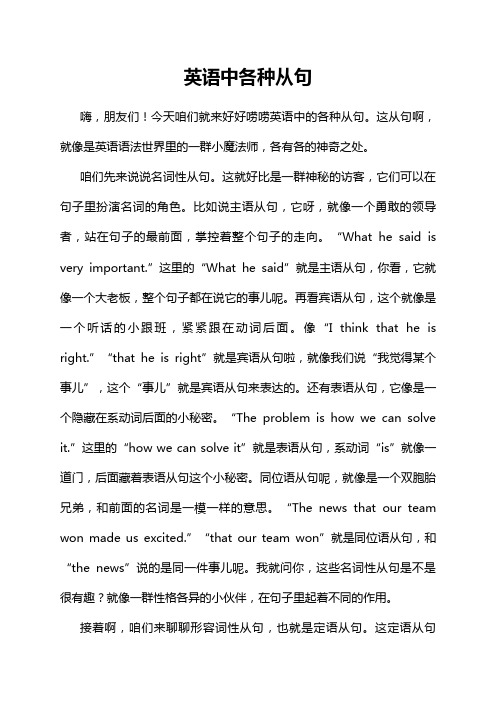
英语中各种从句嗨,朋友们!今天咱们就来好好唠唠英语中的各种从句。
这从句啊,就像是英语语法世界里的一群小魔法师,各有各的神奇之处。
咱们先来说说名词性从句。
这就好比是一群神秘的访客,它们可以在句子里扮演名词的角色。
比如说主语从句,它呀,就像一个勇敢的领导者,站在句子的最前面,掌控着整个句子的走向。
“What he said is very important.”这里的“What he said”就是主语从句,你看,它就像一个大老板,整个句子都在说它的事儿呢。
再看宾语从句,这个就像是一个听话的小跟班,紧紧跟在动词后面。
像“I think that he is right.”“that he is right”就是宾语从句啦,就像我们说“我觉得某个事儿”,这个“事儿”就是宾语从句来表达的。
还有表语从句,它像是一个隐藏在系动词后面的小秘密。
“The problem is how we can solve it.”这里的“how we can solve it”就是表语从句,系动词“is”就像一道门,后面藏着表语从句这个小秘密。
同位语从句呢,就像是一个双胞胎兄弟,和前面的名词是一模一样的意思。
“The news th at our team won made us excited.”“that our team won”就是同位语从句,和“the news”说的是同一件事儿呢。
我就问你,这些名词性从句是不是很有趣?就像一群性格各异的小伙伴,在句子里起着不同的作用。
接着啊,咱们来聊聊形容词性从句,也就是定语从句。
这定语从句啊,就像是一个挑剔的选美评委。
它的任务就是给名词打扮,让这个名词变得更具体、更独特。
“I like the book which/that is very interesting.”这里的“which/that is very interesting”就是定语从句,它就像一个标签,贴在“the book”这个名词上,告诉我们是一本“非常有趣的书”。
各种从句的英语表达
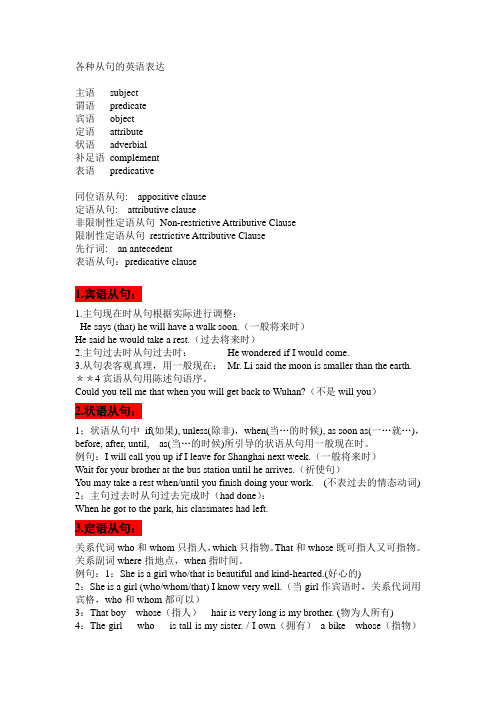
各种从句的英语表达主语subject谓语predicate宾语object定语attribute状语adverbial补足语complement表语predicative同位语从句: appositive clause定语从句: attributive clause非限制性定语从句Non-restrictive Attributive Clause限制性定语从句restrictive Attributive Clause先行词: an antecedent表语从句:predicative clause1.宾语从句:1.主句现在时从句根据实际进行调整:He says (that) he will have a walk soon.(一般将来时)He said he would take a rest.(过去将来时)2.主句过去时从句过去时:He wondered if I would come.3.从句表客观真理,用一般现在:Mr. Li said the moon is smaller than the earth.**4宾语从句用陈述句语序。
Could you tell me that when you will get back to Wuhan?(不是will you)2.状语从句:1;状语从句中if(如果), unless(除非),when(当…的时候), as soon as(一…就…),before, after, until, as(当…的时候)所引导的状语从句用一般现在时。
例句:I will call you up if I leave for Shanghai next week.(一般将来时)Wait for your brother at the bus station until he arrives.(祈使句)You may take a rest when/until you finish doing your work. (不表过去的情态动词) 2;主句过去时从句过去完成时(had done):When he got to the park, his classmates had left.3.定语从句:关系代词who和whom只指人,which只指物。
英语中8种从句介绍-锐
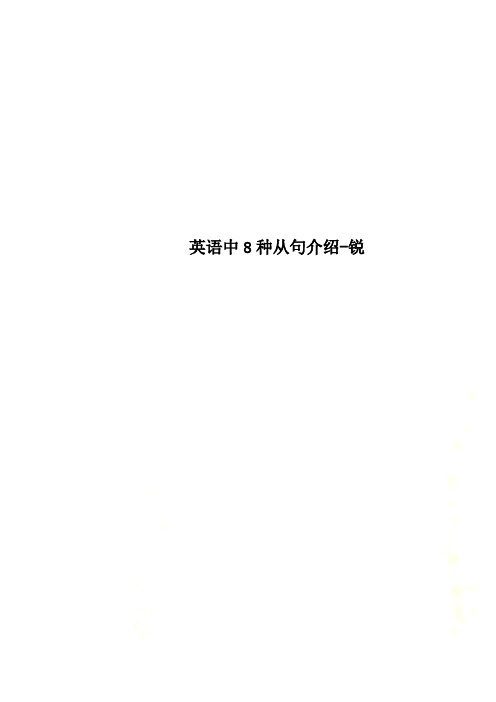
英语中8种从句介绍-锐从句是相对于主句而言的,即它是从属于某一个主句,而不能单独作一个句子.在英语中,主要有三大从句,即名词性从句(包括主语从句,宾语从句,表语从句,同位语从句)、形容词性从句(即定语从句)、副词性从句(即状语从句,包括时间、条件、结果、目的、原因、让步、地点、方式等).主语从句用作主语,如::That the earth is round is true.地球为圆的是真实的.宾语从句用作宾语.如:Do you know where he lives?表语从句用作表语,如:My opinion is that you should not go alone.我的意见是你不应单独前往.同位语从句用于解释说明前面的名词.如:The fact that the earth is round is true.地球是圆的的事实是真实的.(that从句用于解释说明the fact)定语从句相当于一个形容词,用于修饰前面的名词.如:The student who answered the question was John.回答问题的学生是John.状语从句相当于一个副词,如:When it rains,I usually go to school by bus.天下雨时,我通常坐公共汽车上学.(时间状语)If he comes tomorrow,you will see him.如果他明天来,你就可以看见他.(if 引导的条件状语从句,其结构为:if +状语从句,+主句).要注意在状语从句中有一个规则是“主将从现”,即主句是将来时,则从句要用一般现在时表示将来.主句和从句的划分方法是相同的.句子的成分从谓语动词处来划分比较容易.谓语动词前面的部分是主语,后面常接宾语,修饰谓语动词的是状语,修饰主语、宾语的是定语,若谓语是系动词,则系动词后的部分是表语.如:I am a teacher.其中,I 是主语,am是谓语,a teacher 是表语.He likes playing football very mucy.其中,he是主语,likes是谓语,playing football是宾语,very much是状语.英语中8种从句介绍1定语从句2时间状语从句3地点状语从句4条件状语从句5同位语从句6表语从句7宾语从句8主语从句名词性从句:在句子中起名词作用的句子叫名词从句(Noun Clauses).名词从句的功能相当于名词词组,它在复合句中能担任主语、宾语、表语、同位语、介词宾语等,因此根据它在句中不同的语法功能,名词从句又可分别称为主语从句、宾语从句、表语从句和同位语从句.引导名词性从句的连接词引导名词性从句的连接词可分为三类:连接词:that,whether,if 不充当从句的任何成分)连接代词:what,whatever,who,whoever,whom,whose,which.连接副词:when,where,how,why不可省略的连词:1.介词后的连词2.引导主语从句和同位语从句的连词不可省略.That she was chosen made us very happy.We heard the news that our team had won.比较:whether与if 均为"是否"的意思.但在下列情况下,whether 不能被if 取代:1.whether引导主语从句并在句首2.引导表语从句3.whether从句作介词宾语4.从句后有"or not"Whether he will come is not clear.大部分连接词引导的主语从句都可以置于句末,用 it充当形式主语.It is not important who will go.It is still unknown which team will win the match.)由从属连词that引导的从句叫做名词性that-从句.That只起连接主句和从句的作用,在从句中不担任任何成分,本身也没有词义.名词性that-从句在句中能充当主语、宾语、表语、同位语和形容词宾语,例如:主语:That he is still alive is sheer luck.他还活着全靠运气. 宾语:John said that he was leaving for London on Wednesday.约翰说他星期三要到伦敦去.表语:The fact is that he has not been seen recently.事实是近来谁也没有见过他.同位语:The fact that he has not been seen recently disturbs everyone in his office.近来谁也没有见过他,这一事实令办公室所有的人不安.形容词宾语:I am glad that you are satisfied with your job. 你对工作满意我感到很高兴.2)That- 从句作主语通常用it作先行词,而将that-从句置于句末,例如:It is quite clear that the whole project is doomed to failure.很清楚,整个计划注定要失败.It's a pity that you should have to leave.你非走不可真是件憾事一、什么是英语从句?要回答这个问题,先要弄清楚两个小问题:1、什么叫英语的句子一般情况下,英语句子中必定有一个主语和谓语,或者说,有主语和谓语组成的句子就是句子.例如:Mr. Wang teaches English in a middle school.Many trees were planted last spring.2、英语句子的成份英语的句子中,不仅只有主语和谓语,还有其它的句子成份,其中最主要的成份有:主语、谓语、宾语、状语、定语等.这几种成份在句子的位置大致是:(状语) + (定语)主语(定语) + (状语)谓语(状语) + (定语)宾语(宾语补足语) + (状语)也就是,定语一般位于主语和宾语的前后;状语一般位于谓语的前后;及物动词后一般接宾语和宾语补足语.有一点请注意:英语句子中状语的位置非常灵活,它在句首、句中、句末都可以.3、什么是英语的从句在明白了英语句子的成份之后,再来讨论英语从句就比较简单了.因为,什么叫从句呢?就是英语句中的某一成份不是一个单词或词组,而是一个句子,那么这个担任成份的句子就叫从句.如果定语是一个句子,它就叫定语从句;如果宾语是一个句子,它就是宾语从句.依此类推.例如:The boy and the dog [that are in the picture ]are very lovely. (括号中that开始的句子就是定语从句)We revisited the village [where we had worked before.] (括号中where引导的句子也是定语从句)He learned [that this was a hard work (which must be finished in a week.)] (这句里有两个从句,方括号由that引导的是宾语从句;在这个宾语从句中又包含了一个由which引导的定语从句.)因此,对于一个比较复杂的较长的英语句子来说,它就可能存在几个句子,即主句和担任各种成份的从句.从这个角度看,也可以说从句是句子中的句子.二、定语从句(Attributive Clauses)在句中做定语,修饰一个名词或代词,被修饰的名词,词组或代词即先行词.定语从句通常出现在先行词之后,由关系词(关系代词或关系副词)引出.关系代词有:who, whom, whose, that, which等.关系副词有:when, where, why等. 18.1 关系代词引导的定语从句关系代词所代替的先行词是人或物的名词或代词,并在句中充当主语、宾语、定语等成分.关系代词在定语从句中作主语时,从句谓语动词的人称和数要和先行词保持一致.1)who, whom, that这些词代替的先行词是人的名词或代词,在从句中所起作用如下:Is he the man who/that wants to see you?他就是你想见的人吗?(who/that在从句中作主语)He is the man whom/ that I saw yesterday.他就是我昨天见的那个人.(whom/that在从句中作宾语)2) Whose 用来指人或物,(只用作定语, 若指物,它还可以同of which互换), 例如:They rushed over to help the man whose car had broken down. 那人车坏了,大家都跑过去帮忙.Please pass me the book whose (of which) cover is green. 请递给我那本绿皮的书.3)which, that它们所代替的先行词是事物的名词或代词,在从句中可作主语、宾语等,例如:A prosperity which / that had never been seen before appears in the countryside. 农村出现了前所未有的繁荣.(which / that 在句中作宾语)The package (which / that) you are carrying is about to come unwrapped. 你拿的包快散了.(which / that在句中作宾语 18.2 关系副词引导的定语从句关系副词可代替的先行词是时间、地点或理由的名词,在从句中作状语.1)when, where, why关系副词when, where, why的含义相当于"介词+ which"结构,因此常常和"介词+ which"结构交替使用,例如:There are occasions when (on which) one must yield. 任何人都有不得不屈服的时候.Beijing is the place where (in which) I was born. 北京是我的出生地.Is this the reason why (for which) he refused our offer? 这就是他拒绝我们帮助他的理由吗?2)that代替关系副词that可以用于表示时间、地点、方式、理由的名词后取代when, where, why和"介词+ which"引导的定语从句,在口语中that常被省略,例如:His father died the year (that / when / in which) he was born. 他父亲在他出生那年逝世了.He is unlikely to find the place (that / where / in which) he lived forty years ago. 他不大可能找到他四十年前居住过的地方.用关系代词,还是关系副词完全取决于从句中的谓语动词.及物动词后面无宾语,就必须要求用关系代词;而不及物动词则要求用关系副词.例如:This is the mountain village where I stayed last year.I'll never forget the days when I worked together with you. 判断改错(注:先显示题,再显示答案,横线;用不同的颜色表示出.)(错) This is the mountain village where I visited last year. (错)I will never forget the days when I spent in the countryside.(对) This is the mountain village (which) I visited last year.(对) I'll never forget the days (which) I spent in the countryside.习惯上总把表地点或时间的名词与关系副词 where, when联系在一起.此两题错在关系词的误用上.内容提要定语从句是由关系代词和关系副词引导的从句,其作用是作定语修饰主句的某个成分,定语从句分为限定性和非限定性从句两种.状语从句分为时间状语从句,结果状语从句,让步状语从句,原因状语从句,条件状语从句以及行为方式状语从句.名词从句包括主语从句,宾语从句,表语从句和同位语从句及there be句型.一、限定性定语从句1. that即可代表事物也可代表人,which代表事物;它们在从句中作主语或宾语,that在从句中作宾语时常可省略关系词,which在从句中作宾语则不能省略.而且,如果which在从句中作“不及物动词+介词”的介词的宾语,注意介词不要丢掉,而且介词总是放在关系代词which的前边,但有的则放在它原来的位置2. which作宾语时,根据先行词与定语从句之间的语义关系,先行词与which之间的介词不能丢3. 代表物时多用which,但在带有下列词的句子中用that而不用which,这些词包括all, anything, much等,这时的that常被省略4. who和whom引导的从句用来修饰人,分别作从句中的主语和宾语,whom作宾语时,要注意它可以作动词的宾语也可以作介词的宾语5. where是关系副词,用来表示地点的定语从句6. when引导定语从句表示时间〔注〕值得一提的是,表示时间“time"一词的定语从句只用when引导,有时不用任何关系代词,当然也不用that引导By the time you arrive in London, we will have stayed there for two weeks.I still remember the first time I met her.Each time he goes to besiness trip, he brings a lot of living necessities, such as towers, soap, toothbrush etc.7. whose是关系代词,修饰名词作定语,相当于所修饰成分的前置所有格8. 当从句的逻辑主语是some, any, no, somebody, anybody, nobody, something, anything, everything或nothing时,常用there is来引导二、非限定性定语从句:非限定性定语从句的作用是对所修饰的成分作进一步说明,通常和主句间用逗号隔开,将从句拿掉后其他部分仍可成立1. which引导的非限定性定语从句来说明前面整个句子的情况或主句的某一部分2. 在引导限定性定语从句时,that有时相当于in which, at which, for which或at whichAttitudes towards daydreaming are changing in much the same way that(in which) attitudes towards night dreaming have changed. 人们对白日做梦的态度正在改变,这与人们对夜间做梦的看法的变化有非常相似之处.I like the music for the very reason that(for which) he dislike it. 我出于某种原因喜欢这种音乐,而他恰恰与我相反.We arrived the day that(on which) they left. 刚好我们到的那天他们走了.3. 有时as也可用作关系代词4. 在非限定性定语从句中,不能用that,而用who, whom代表人,用which代表事物先行词:是在定语从句中,被定语从句所修饰的名词.例如:He is a teacher who teach our English.在这里定词从句who teach our English是来修饰前面的名词teacher.所以teacher就是一个先行词.再说下它的用法:1、先行词指人时,引导词可用Who,Whom,及that,其中当引导词在句中作主语时用Who或that;当其充当宾语时用whom或that,在非正式宾语中也可用who,也可省略.a That boy who/that broke the window is called Tom.b The person to whom you just talked is Mr Li.b 句可改为:The person(that/whom/who)you just talked to is Mr Li.2、先行词指物时,引导词用that或whicha.They planted the trees which didn’t need much water.b .The fish (which)we bought were not fresh.3、先行词指时间时,引导词用When/on which或in whicha.I still remember the day when/on which I first came to Bei jing.b.I'll never forget the year when/ on which we worked on the farm.4、先行词指地点时,引导词用Where或in whichThis is the house where/in which we lived last year.或:This is the house that/which we lived in last year.5、whose在定语从句中作定语时,可用来指人,也可以用来指物,如:a.This is the boy whose mother died a month ago.b.This is the house whose windows were broken.此句可改成:This is the house the windoues of which were broken.6、先行词表示原因时,引导词用why,如:The reason why he was late for school was that he had been knocked down by a bike.二、物殊情况:尽管有以上基本原则,但要学好定语从句更应注意以下特殊情况;Ⅰ、当定语从句的先行词为表示人的不定代词,如anyone,anybody,everyone,everybody,noone,nobody,all,these ,those等时,用who而不用thatThose who break the rule are pulished.Anybody who had eyes could see the elephant was like a snake. Ⅱ.以who或which作主语的特殊疑问句中先行词指人,引导词只用That,如:a.Who is the person that is standing at the gate ?b.Which of you that knows something about English doesn’t know this word?Ⅲ、先行词指物时引导词用that而不用which的情况:1、先行词有序数词或形容词最高级修饰时,This is the best composition that has been written in English.2、先行词是all,something,anything,nothing,everything,little,few,much等不定代词时There is nothing/little/much that we can do for her.3、先行词被all,every,no,some,any,little,much等修饰时I’ve read all the books that you gave me.4、先行词被the only/very等修饰时This is the very/last place that they visited yesterday. 5、有两个以上先行词,分别表示人或物时They talked about the teachers and the schools that they had visited.6、先行词为基数时Yesterday I caught two fish,Now you can see the two that are still alive in a basin of water.Ⅳ.time为先行词时,前边如有序数词修饰时,定语从句引导词用that或什么也不用,如没序数词修饰时,用when或that均可a.This is the last time(that)I shall give you a lesson.先行词指人时,引导词可用Who,Whom,及that,其中当引导词在句中作主语时用Who或that;当其充当宾语时用whom或that,在非正式宾语中也可用who,也可省略.a That boy who/that broke the window is called Tom.b The person to whom you just talked is Mr Li.b 句可改为:The person(that/whom/who)you just talked to is MrLi.2、先行词指物时,引导词用that或whicha.They planted the trees which didn’t need much water.b .The fish (which)we bought were not fresh.3、先行词指时间时,引导词用When/on which或in whicha.I still remember the day when/on which I first came to Bei jing.b.I'll never forget the year when/ on which we worked on the farm.4、先行词指地点时,引导词用Where或in whichThis is the house where/in which we lived last year.或:This is the house that/which we lived in last year.5、whose在定语从句中作定语时,可用来指人,也可以用来指物,如:a.This is the boy whose mother died a month ago.b.This is the house whose windows were broken.此句可改成:This is the house the windoues of which were broken.6、先行词表示原因时,引导词用why,如:The reason why he was late for school was that he had been knocked down by a bike.。
英语中的各种从句详解
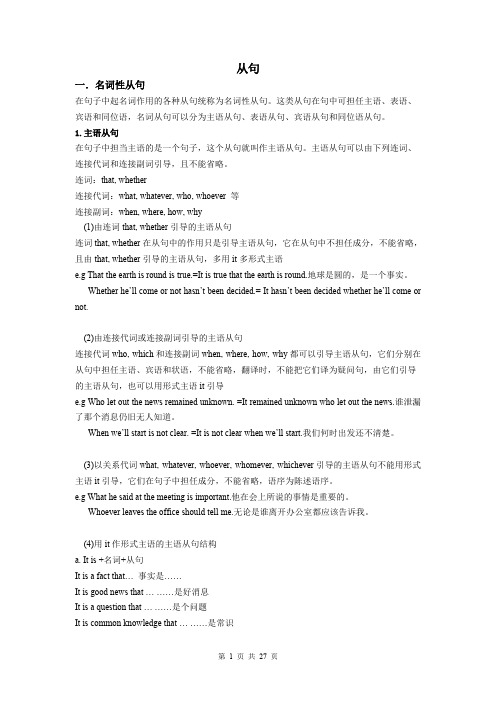
从句一.名词性从句在句子中起名词作用的各种从句统称为名词性从句。
这类从句在句中可担任主语、表语、宾语和同位语,名词从句可以分为主语从句、表语从句、宾语从句和同位语从句。
1.主语从句在句子中担当主语的是一个句子,这个从句就叫作主语从句。
主语从句可以由下列连词、连接代词和连接副词引导,且不能省略。
连词:that, whether连接代词:what, whatever, who, whoever 等连接副词:when, where, how, why(1)由连词that, whether引导的主语从句连词that, whether在从句中的作用只是引导主语从句,它在从句中不担任成分,不能省略,且由that, whether引导的主语从句,多用it多形式主语e.g That the earth is round is true.=It is true that the earth is round.地球是圆的,是一个事实。
Whether he’ll come or not hasn’t been decided.= It hasn’t been decided whether he’ll come or not.(2)由连接代词或连接副词引导的主语从句连接代词who, which和连接副词when, where, how, why都可以引导主语从句,它们分别在从句中担任主语、宾语和状语,不能省略,翻译时,不能把它们译为疑问句,由它们引导的主语从句,也可以用形式主语it引导e.g Who let out the news remained unknown. =It remained unknown who let out the news.谁泄漏了那个消息仍旧无人知道。
When we’ll start is not clear. =It is not clear when we’ll start.我们何时出发还不清楚。
九种英语主语从句

九种英语主语从句英语中,主语从句是一种非常常见的从句结构。
它可以用作句子的主语,起到引出或说明整个句子的作用。
以下是九种常见的英语主语从句的类型及示例:1. 名词从句(Noun Clauses):名词从句作为主语,用于引出或说明某个事物或情况的真相、原因、目的等。
示例:- What he said is true.(他说的是对的。
)2. 代词从句(Pronoun Clauses):代词从句用一个代词作为主语,描述或说明某人或某事。
示例:- It's important that we finish the project on time.(我们按时完成项目非常重要。
)- Whoever wants to join the club can sign up here.(想加入俱乐部的人可以在这里报名。
)3. 形容词从句(Adjective Clauses):形容词从句用于修饰某个名词,作为主语起到描述或说明的作用。
示例:- What you just said is not relevant.(你刚才说的不相关。
)- Where he was born has always been a mystery.(他出生在哪里一直是个谜。
)4. 副词从句(Adverb Clauses):副词从句用于描述或说明一个动作或状态的条件、原因、时间、地点等。
示例:- When he arrives, we can start the meeting.(他一到,我们就可以开始会议。
)- If you study hard, you will pass the exam.(如果你努力研究,你会通过考试。
)5. 不定式从句(Infinitive Clauses):不定式从句用于说明一个动作的目的、结果等。
示例:- To win the game is our ultimate goal.(赢得比赛是我们的终极目标。
英语各种从句的详细讲解

英语各种从句的详细讲解英语从句(Subordination)英语从句主要有定语从句,状语从句和名词性从句(主语从句,宾语从句,表语从句,同位语从句)一.定语从句1.定语从句:由关系代词who,whom,whose,that,which;关系副词when,where,why引导。
1.The death notices tell us about people who have died during the week.2.The man(whom)you spoke to just now is my friend.3.The building whose lights are on is beautiful.4.Please find a place which we can have a private talk in.5.The knee is the joint where the thighbone meets the large bone of the lower leg.6.He still remembers the day when he went to school.7.It is no need telling us the reason why you didn't finish it in time.8.He has three sons,two of whom died in the war.9.Mr.Smith,whose wife is a clerk,teaches us English.10.In the Sunday paper there are comics,which children enjoy.2.只能用that和who引导的定语从句A.all,nothing,anything,a few,one做先行词指物时B.先行词前有形容词最高级修饰时,后面常跟that而不是which.C.先行词前有the only,the first,the last,the next,the very 等词修饰时,引导词只能用that。
英语从句辨析50个例句

英语从句辨析50个例句全文共四篇示例,供读者参考第一篇示例:英语从句是英语语法中一个非常重要的部分,许多学习者在学习英语的过程中经常会混淆各种不同类型的从句,导致语言表达不够准确。
在这里将带大家练习50个不同类型的英语从句,帮助大家更好地理解和运用英语从句。
1. 偏转疑问句:请你把那本书给我好吗?Can you please give me that book?2. 定语从句:这是我买的鞋。
These are the shoes that I bought.4. 原因状语从句:因为我生病了,所以我没有去上学。
I didn't go to school because I was sick.7. 目的状语从句:我帮他学习,以便他能及时完成作业。
I helped him study so that he could finish his homework on time.8. 地点状语从句:你在哪里见到他的?Where did you see him?10. 比较状语从句:我比他更高。
I am taller than him.12. 主语从句:你是否知道他的名字?Do you know what his name is?16. 虚拟语气从句:如果我是你,我会努力学习。
If I were you, I would study hard.21. 结果从句:他努力学习,因此取得了很好的成绩。
He studied hard, so he got very good grades.23. 地点从句:我不知道在哪里可以买到这本书。
I don't know where to buy this book.31. 让步从句:尽管天气很冷,但他准时到达了。
Despite the cold weather, he arrived on time.34. 结果从句:他下了很多功夫,终于通过了考试。
He put in a lot of effort and finally passed the exam.45. 条件从句:如果你明天去购物,记得给我买件新衣服。
英语中的各种从句
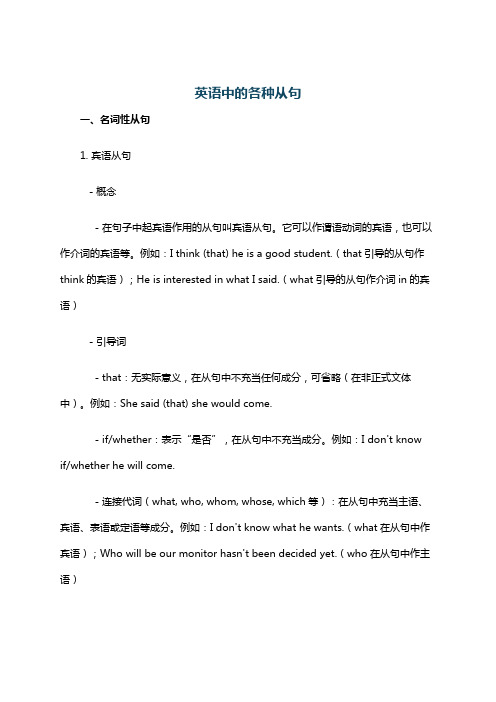
英语中的各种从句一、名词性从句1. 宾语从句- 概念- 在句子中起宾语作用的从句叫宾语从句。
它可以作谓语动词的宾语,也可以作介词的宾语等。
例如:I think (that) he is a good student.(that引导的从句作think的宾语);He is interested in what I said.(what引导的从句作介词in的宾语)- 引导词- that:无实际意义,在从句中不充当任何成分,可省略(在非正式文体中)。
例如:She said (that) she would come.- if/whether:表示“是否”,在从句中不充当成分。
例如:I don't know if/whether he will come.- 连接代词(what, who, whom, whose, which等):在从句中充当主语、宾语、表语或定语等成分。
例如:I don't know what he wants.(what在从句中作宾语);Who will be our monitor hasn't been decided yet.(who在从句中作主语)- 连接副词(when, where, why, how等):在从句中作状语。
例如:I wonder when he will arrive.(when在从句中作时间状语)- 语序- 宾语从句要用陈述语序,即“连接词+主语+谓语+其他成分”。
例如:He asked me where I was going. 而不是He asked me where was I going.- 时态- 如果主句是一般现在时,从句可以根据实际情况使用任何时态。
例如:I know that he went to Beijing yesterday.(从句用一般过去时);I know that he will come tomorrow.(从句用一般将来时)- 如果主句是一般过去时,从句要用相应的过去时态(一般过去时、过去进行时、过去将来时、过去完成时)。
各种从句的英语表达方式
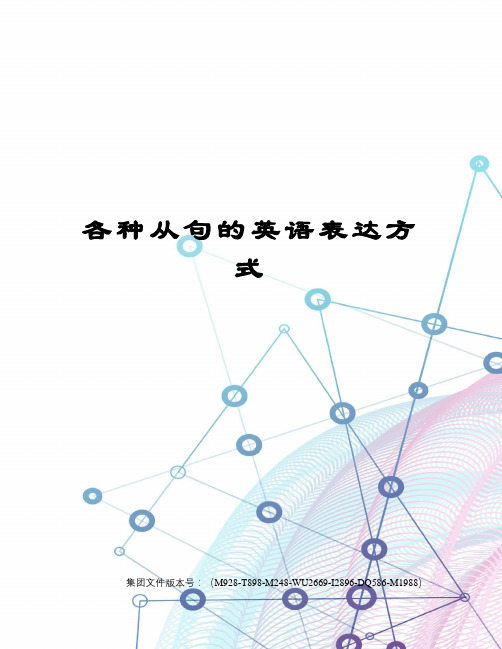
各种从句的英语表达方式集团文件版本号:(M928-T898-M248-WU2669-I2896-DQ586-M1988)从句c l a u s e从属句s u b o r d i n a t e c l a u s e 并列句c o o r d i n a t e c l a u s e 名词从句n o m i n a l c l a u s e 定语从句a t t r i b u t i v e c l a u s e 状语从句a d v e r b i a l c l a u s e 宾语从句o b j e c t c l a u s e 主语从句s u b j e c t c l a u s e 同位语从句a p p o s i t i v e c l a u s e时间状语从句a d v e r b i a l c l a u s e o f t i m e 地点状语从句a d v e r b i a l c l a u s e o f p l a c e 方式状语从句a d v e r b i a l c l a u s e o f m a n n e r 让步状语从句a d v e r b i a l c l a u s e o f c o n c e s s i o n 原因状语从句a d v e r b i a l c l a u s e o f c a u s e结果状语从句a d v e r b i a l c l a u s e o f r e s u l t目的状语从句a d v e r b i a l c l a u s e o f p u r p o s e条件状语从句a d v e r b i a l c l a u s e o f c o n d i t i o n真实条件状语从句a d v e r b i a l c l a u s e o f r e a l c o n d i t i o n非真实条件状语从句 adverbial clause of unreal condition句子s e n t e n c e简单句s i m p l e s e n t e n c e并列句c o m p o u n d s e n t e n c e复合句c o m p l e x s e n t e n c e并列复合句c o m p o u n d c o m p l e x s e n t e n c e陈述句d e c l a r a t i v e s e n t e n c e疑问句i n t e r r o g a t i v e s e n t e n c e一般疑问句g e n e r a l q u e s t i o n 特殊疑问句s p e c i a l q u e s t i o n 选择疑问句a l t e r n a t i v e q u e s t i o n 附加疑问句t a g q u e s t i o n 反义疑问句d i s j u n c t i v e q u e s t i o n 修辞疑问句r h e t o r i c a l q u e s t i o n 感叹疑问句e x c l a m a t o r y q u e s t i o n存在句e x i s t e n t i a l s e n t e n c e 肯定句p o s i t i v e s e n t w e n c e 否定句n e g a t i v e s e n t e n c e 祈使句i m p e r a t i v e s e n t e n c e 省略句e l l i p t i c a l s e n t e n c e 感叹句e x c l a m a t o r y s e n t e n c e基本句型b a s i c s e n t e n c e p a t e r n句子成分m e m b e r s o f s e n t e n c e s 主语s u b j e c t谓语p r e d i c a t e宾语o b j e c t双宾语d u a l o b j e c t 直接宾语d i r e c t o b j e c t 间接宾语i n d i r e c t o b j e c t 复合宾语c o m p l e x o b j e c t 同源宾语c o g n a t e o b j e c t 补语c o m p l e m e n t主补s u b j e c t c o m p l e m e n t 宾补o b j e c t c o m p l e m e n t 表语p r e d i c a t i v e定语a t t r i b u t e同位语a p p o s i t i v e状语a d v e r b i a l人称p e r s o n第一人称f i r s t p e r s o n第二人称s e c o n d p e r s o n第三人称t h i r d p e r s o n时态t e n s e 一般现在时 present simple tense一般过去时 past simple tense一般将来时 future simple tense现在完成时 present perfect tense现在进行时 present continuous tense过去完成时 past perfect tense过去进行时 past continuous tene过去将来时 past future tense?将来完成时 future perfect tense将来进行时 future continuous tense过去将来完成时 past future perfect tense过去将来进行时 past future continuous tense过去完成进行时 past perfect continuous tense现在完成进行时 present perfect continuous tense语态 voice主动语态 active voice被动语态 passive voice语气 mood陈述语气 indicative mood 祈使语气 imperative mood 虚拟语气 subjunctive mood否定 negation否定范围 scope of negation 全部否定 full negation局部否定 partial negation 转移否定 shift of negation语序 order自然语序 natural order倒装语序 inversion全部倒装 full inversion部分倒装 partial inversion直接引语 direct speech间接引语 indirect speech自由直接引语 free direct speech自由间接引语 free indirect speech一致 agreement主谓一致 subject-predicate agreement 语法一致 grammatical agreement概念一致 notional agreement就近原则 principle of proximity。
九种英语表语从句
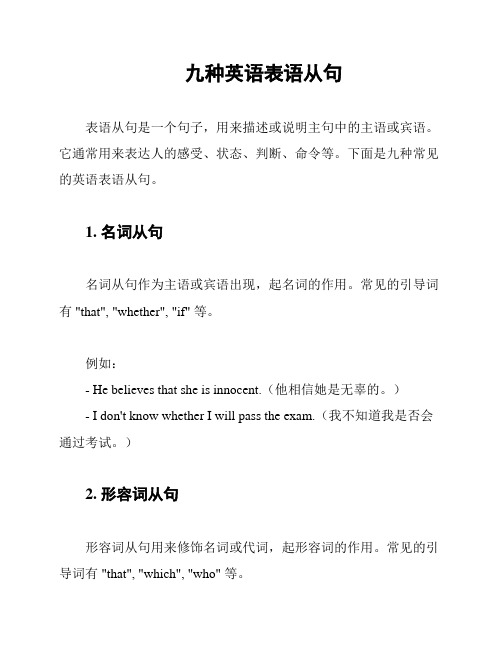
九种英语表语从句表语从句是一个句子,用来描述或说明主句中的主语或宾语。
它通常用来表达人的感受、状态、判断、命令等。
下面是九种常见的英语表语从句。
1. 名词从句名词从句作为主语或宾语出现,起名词的作用。
常见的引导词有 "that", "whether", "if" 等。
例如:- He believes that she is innocent.(他相信她是无辜的。
)- I don't know whether I will pass the exam.(我不知道我是否会通过考试。
)2. 形容词从句形容词从句用来修饰名词或代词,起形容词的作用。
常见的引导词有 "that", "which", "who" 等。
例如:- This is the book that I like.(这是我喜欢的书。
)- The person who helped me is my friend.(帮助我的人是我的朋友。
)3. 副词从句副词从句用来修饰动词、形容词或副词,起副词的作用。
常见的引导词有 "when", "where", "why", "how" 等。
例如:- I will call you when I arrive.(我到达时会打电话给你。
)- He explained why he was late.(他解释了他为什么迟到。
)4. 表语从句表语从句用来表示主语的状态、性质、身份等。
常见的引导词有 "that", "as if", "as though" 等。
例如:- The fact is that he is guilty.(事实是他有罪。
英语六大从句

从句有主语从句、表语从句、宾语从句、同位语从句、定语从句和状语从句6类.前四类由于主语从句、表语从句、宾语从句及同位语从句在句子的功用相当于名词,所以通称名词性从句;后两类定语从句和状语从句功用相当于形容词,称为形容词性从句.状语从句还可以分为条件状语从句、原因状语从句、方位状语从句和时间状语从句.1.主语从句(Subject Clause):用作主语的从句叫主语从句.引导主语从句的关联词有从属连词、疑问代词、疑问副词、缩合连接代词、缩合连接副词等.2.表语从句 Predicative Clause):用作表语的从句叫表语从句.引导表语从句的关联词与引导主语从句的关联词大都一样.3.宾语从句(Object Clause):在句子中起宾语作用的从句叫做宾语从句.宾语从句分为三类:动词的宾语从句,介词的宾语从句和形容词的宾语从句.第一部分一.、定义:宾语从句就是一个句子作动词或介词的宾语.二、学习宾语从句要抓住三要素:连接词、语序和时态.连接词一般都是that(指事务或人),which 指事),who 指人)1.从句为陈述句,常选择连接词that或将that省略,直接与主句相连.2.从句为一般疑问句,常选择连接词if或whether.在whether…or not结构中不能用if替换. 3.从句为特殊疑问句,常选择what,when,where,which,who,how等的疑问代、副词作连接词.★当who为主语时,句式为:who+谓语+其他判断时态情况:1.主句是一般现在时,从句为各种时态情况2.主句是一般过去时,从句为各种相应过去时态注意:从句描绘客观事实,用一般现在时3.主句是一般将来时,一般从句为一般现在时 “主将从现”)例题:〈1. The teacher told the children that the sun__B__round.A. wasB. isC. wereD. are 答案为B,属于第二种情况.宾语从句,在复合句中作宾语,位于及物动词后;Tell him which class you are in .(1)主、从句时态一致:主句谓语过去时,从句相应过去时;He answered that he was listening to me.主句谓语现在时,从句时态任所需;He says (that) he will leave a message on my desk.具体过去永不变,真理格言现在时;He told me that he was born in 1980.2)否定前移,及完成反意问句;在think / believe / suppose / guess / imagine / expect等动词后跟宾语从句否定式时,应转移到主句上去,完成反意疑问句时,应与从句主、谓保持一致.(注: 否定前移的条件是,主句主语是第一人称)I don't think you are right ,are you ?3)在表示建议suggest , advise要求demand 、desire、require、request、propose;决定decide; 命令order、command; 坚决主张insist;等动词后跟宾语从句,用 should)+v. 虚拟语气)eg.I suggested that you should)study hard.4)如果宾语从句后有宾语补足语,用it作形式宾语,把宾语从句后置eg.You may think it strange that he would live there.5)宾语从句that常可省略,但在以下情况下不能省略A.当主句谓语动词带有两个或两个以上宾语从句时,可以省略第一个that,其他不能省略. eg.I believe that)you have done your best and that things will get bet?鄄ter.B.当it作形式宾语时eg.She made it clear that she had nothing to do with him.C.当宾语从句前置时eg.That our team will win,I believe.三、分类A 、作动词的宾语:eg.I heard the newsI 主语heard 谓语动词the news.名词作宾语I主语heard 谓语动词that he would come here later on.一个句子作宾语---宾语从句B 、作介词的宾语:eg.He said nothing about this plan .He主语said 谓语动词nothing 代词作动词的宾语about 介词the plan. 名词作介词的宾语四、带有宾语从句的复合句的构成:带有宾语从句的复合句就是用连接词把一个主句和一个宾语从句连接在一起.连接词有:that(可省略),what, who, when, where, why, which, if, whether, how.五、注意:A 宾语从句必须用陈述语序.False: He is wondering when can he finish this difficult job.Right: He is wondering when he can finish this difficult job.B 有时候可以用it 作形式宾语,而把真正的宾语从句放在后面.Bad: I thought that he could finish this job in just two hours impossible.Good: I thought it impossible that he could finish this job in just two hours.Bad: He left whether we should continue this project to my judgment.Good: He left it to my judgment whether we should continue this project.C 带有宾语从句的复合句的否定形式一般是否定主句.Bad: I think he doesn’t like the English teacher.Good: I don’t think he likes the English teacher.D False: He wanted to know why he is crying in the corner.Right: He wanted to know why he was crying in the corner.4.同位语从句(Appositive Clause):与先行词同位或等同的从句叫作同位语从句.其关联词多为that.5.定语从句 Attributive Clause):用作定语的从句叫定语从句.定语从句一般皆放在被它所修饰的名 代)词之后,这种名 代)词就叫作先行词 Antecedent).引导定语从句的关联词为关系代词(或称引导词、关系词等).关系代词在定语从句中可用作主语、宾语、定语等;关系副词在定语从句中用作状语.①引导定语从句的关联词有who, whom, whose, that, when, where, why 和which. 在非限制定语从句中, 只可用which, who, whose, where , when., 如果指代前面整个句子, 多用which.例句:The dog that/which was lost has been found. 失踪的狗已经找到了.)③as 可做引导词引导定语从句, 多和such, the same 连用. As 引导的定语从句也可修饰整个句子, 既可放在先行词后,也可放在句子开头.例句:Such people as you describe are rare nowadays. 你描述的那一类人现在很少了.)④介词+which/whom/whose从句The driver is the man from whose room she had stolen the gold watch. 她就是从那个司机的房间偷了金表的.)⑤代/名+介词+which 从句He is needing a book, the name of which I don't know.( 他需要一本书,但是我不知道书名.)⑥同位语从句和定语从句The news that you told me was really exciting. 你告诉我的好个消息真的是很激动人心.)⑦难句:NO.1He is one of the men who were chosen to represent the group. 他是被选为代表该团队的人中一员.)第二部分一、时态1·主句用一般现在时,从句可用任意时态.2·主句用过去时,从句用过去某个时态.3·主句用过去时,从句是真理时,只用一般现在时.二、宾语从句的几类连接词:①从属连词连接宾语从句的从属连词主要有that,if,whether. that引导表示陈述句的宾语从句,而if和whether引导表示“是否”的宾语从句.例句:I don’t know if there will be a bus any more.我不知道是否还会有公交车.②连接代词连接代词主要有who, whom ,whose ,what ,whoever ,whomever ,whosever, whatever, whichever等.连接代词一般指疑问,但what, whatever除了指疑问外,也可以指陈述.例句:Do you know who has won Red Alert game?你知道谁赢了这一局红警游戏吗?③连接副词连接副词主要有when,where,why,how,whenever,wherever,however等.例句:He didn’t tell me when we should meet again.他没有告诉我什么时候我们能再见面.三、动词的宾语从句大多数动词都可以带宾语从句We all expect that they will win , for members of their team are stronger.我们都预料他们会赢,因为他们的队员更强壮.★部分“动词+副词”结构也可以带宾语从句例句:I have found out that all the tickets for the concert have been sold out.我发现这场音乐会的所有票都卖光了.★动词短语也可以带宾语从句常见的这些词有:make sure确保make up one’s mind下决心keep in mind牢记例句:Make sure that there are no mistakes in your papers before you turn them in.在上交试卷前确保没有任何错误.四、可运用形式宾语it代替的宾语从句①动词find,feel,consider,make,believe等后面有宾语补足语的时候,则需要用it做形式宾语而将that宾语从句后置.例句:I think it necessary that we take plenty of hot water every day .我认为每天多喝开水是有必要的.②有些动词带宾语从句时寻要在宾语与从句前加it这类动词主要有:hate, take , owe, have, see to.例句:I hate it when they with their mouths full of food.我讨厌他们满嘴食物时说话.③若宾语从句是wh-类,则不可用it代替例句:We all consider what you said to be unbelievable.我们都认为你所说的是不可信的.五、介词的宾语从句用wh-类的介词宾语从句例句:We are talking about whether we admit students into our club.我们正在讨论是否让学生加入我们的俱乐部.★用that,if引导的介词宾语从句有时候except,but,besides三个介词后可见到that引导的宾语从句例句:I know nothing about my new neighbor except that he used to work with a company.对于我的新邻居我只知道他曾在一家公司上班,其他一无所知.六、形容词的宾语从句常用来引导宾语从句的形容词有:sure,certain,glad,please,happy,sorry,afraid,satisfied,surprised例句:I am sure I will pass the exam.我确信我会通过考试.七、if,whether在宾语从句中的区别①if和whether在作“是否”解时,引导宾语从句常放在动词know,ask,care,wonder,find out等之后,介词后一般不用if②少数动词,如:leave,put,discuss,doubt后的宾语从句常用whether.③whether后可以加or not,但是if不可以.④在不定式前只能用whether.如:I can’t decide whether to stay. 我不能决定是否留下.⑤避免歧异时,我们常用whether而不用if.八、哪些宾语从句不可以省略引导词that1.当that作learn,suggest,explain,agree,wonder,prove,mean,state,feel,hold等动词的宾语时;2.当宾语从句较长时;3.当主语状语置于主句尾,宾语从句之前时;4.当主语谓语动词(包括非谓语动词)与宾语从句之间有插入语时;5.当一个动词带有两个或两个以上宾语从句时,此时第一个that可以省略,第二个that不可以省略;6.当宾语从句中的主语是this,that或this,that做主语的定语时;7.当宾语从句是双宾语中的直接宾语时;8.当宾语从句的主语是非谓语动词或主语从句时;9.当主语中的谓语动词是固定词组时;10.当宾语从句有it做其先行词时;11.在直接引语中,转述分句把宾语从句隔开时.九、宾语从句的否定转移主句的谓语动词是think,believe,imagine,suppose,consider,espect,fancy,guess等,并且主句的主语是第一人称而且为一般现在时,从句的否定词一般要转移到主句上来,其反义疑问句一般与宾语从句一致.例句:I don’t think he will come to my party.而不能说成I think he won’t come to my party.我认为他不会来我的舞会.★如果宾语从句中有某个含有否定意义的形容词或副词,其反义疑问句要用肯定形式.例句:We find that he never listens to the teacher carefully,does he?我们发现他从来不仔细听老师讲课,是不是?十、宾语从句的时态和语序当主句为现在时或将来时的时候,宾语从句的时态一般不受主句的时态所影响.当主句为过去时的时,细分为一下几种情况:①从句用一般过去时或过去进行时表示与主句谓语动词动作同时发生例句:I only knew he was studying in a western country,but I didn’t know what country he was in.我只知道他当时在西方的一个国家读书,可不知道是哪个国家.②从句过去完成时表示该动作发生在主句谓语动作之前例句:He told me that he had told Mary about the meeting already.他告诉我他已经把有关会议的事情告诉的了Mary.③从句谓语用过去将来时表示该动作发生在主句谓语动作之后例句:The reporter asked if the government would take necessary measures to put down the to-do.记者问政府是否会采取必要的措施镇压骚乱.★如果从句是一个客观真理,那么从句的时候不根据主句的时态而变化例句:The teacher said that the moon goes around the earth yesterday.老师昨天说月亮绕着地球转.★当宾语从句的引导词是who,which,what,when,where,how,why等表疑问时,不能按正常语序安排,经常将这类引导词置于句首例句:Who do you think the public might choose as their favorite singer this year?你认为今年公众会选谁为他们最喜欢的歌手.同位语从句用法比较"固定",把关键的几个词背下来 下面这个材料供参考):一、在复合句中用作同位语的从句叫同位语从句.它一般跟在某些名词后面,用以说明该名词表示的具体内容.如:I had no idea that you were here.我不知道你在这里.二、可以跟同位语从句的名词通常有news,idea,fact,promise,question,doubt,thought,hope,message,suggestion,words消息),possibility等.如:I’ve come from Mr wang with a message that he won’t be able to see you this afternoon.我从王先生那里来,他让我告诉你他今天下午不能来看你了.三、英语中引导同位语从句的词通有连词that,whether,连接副词how,when,where等.( 注:if,which 不能引导同位语从句.)如:l have no idea When he will be back.我不知道他什么时候回来.四、有时同位语从句可以不紧跟在说明的名词后面,而被别的词隔开. 如:The thought came to him that maybe the enemy had fled the city.他突然想起可能敌人已经逃出城了.五、同位语从句与定语从句的区别.1、同位语从句与前面的名词是同位关系,即说明它前面名词的内容;而定语从句与前面的名词是修饰与被修饰关系,即限定它前面的名词范围,或补充一些情况.如:The news that l have passed the exam is true.我通过了考试这一消息是真的.同位语从句,即从句所表达的意思就是前面名词的内容.)The news that he told me just now is true.他刚才告诉我的消息是真的.定语从句,从句对前面名词起修饰限制作用,即“他告诉我的”那个消息,而不是别的消息.)2、引导同位语从句的that是连词,在从句中不充当任何成份,而引导定语从句的that是关系代词,除起连接作用外,还在从句中充当主语、宾语或表语等.如:The idea that computers can recognize human voices surprises many people.计算机能够识别人的声音的想法使许多人感到惊奇.that在从句中不充当任何成份.)一个名词(或其它形式)对另一个名词或代词进行修饰,限定或说明,这个名词(或其它形式)就是同位语.同位语与被它限定的词的格要一致,并常常紧挨在一起.1) 非独立的同位语:常出现在被限定词前Bruce Lee (姓名) 李小龙Graf Schmidt (称号,浑名) 施密特伯爵Doktor Wang (职称,头衔) 王博士Uncel Liu (亲戚的称呼) 刘叔叔die Stadt Shanghai (类属名称) 上海市the Province Hebei (类属名称) 河北省das Jahr 2000 (类属名称) 2000 年three Kilo tomato (度量名称) 三公斤西红柿the University Bremen (专有名词) 不来梅大学。
英语的从句
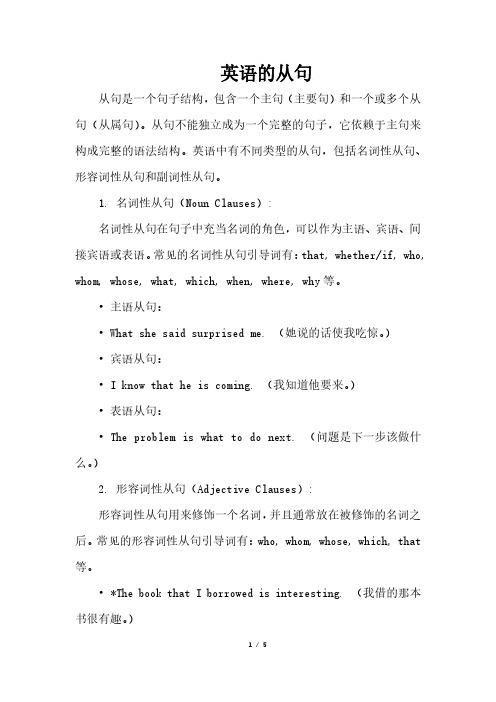
英语的从句从句是一个句子结构,包含一个主句(主要句)和一个或多个从句(从属句)。
从句不能独立成为一个完整的句子,它依赖于主句来构成完整的语法结构。
英语中有不同类型的从句,包括名词性从句、形容词性从句和副词性从句。
1. 名词性从句(Noun Clauses):名词性从句在句子中充当名词的角色,可以作为主语、宾语、间接宾语或表语。
常见的名词性从句引导词有:that, whether/if, who, whom, whose, what, which, when, where, why等。
•主语从句:• What she said surprised me. (她说的话使我吃惊。
)•宾语从句:• I know that he is coming. (我知道他要来。
)•表语从句:• The problem is what to do next. (问题是下一步该做什么。
)2. 形容词性从句(Adjective Clauses):形容词性从句用来修饰一个名词,并且通常放在被修饰的名词之后。
常见的形容词性从句引导词有:who, whom, whose, which, that 等。
• *The book that I borrowed is interesting. (我借的那本书很有趣。
)3. 副词性从句(Adverbial Clauses):副词性从句用来修饰整个句子,通常表达时间、地点、原因、目的、条件、方式等。
常见的副词性从句引导词有:when, where, why, if, although, because, while等。
• *I will call you when I arrive. (我到达时会给你打电话。
)在从句中,引导词不仅起到连接句子的作用,还在从句中充当特定的成分,例如连接代词或连接副词。
了解和正确使用从句可以使语言更加复杂和丰富,并提高表达的准确性。
副词性从句可分为:1. 时间副词性从句:• *I will meet you when the sun sets. (我将在太阳落山时与你见面。
- 1、下载文档前请自行甄别文档内容的完整性,平台不提供额外的编辑、内容补充、找答案等附加服务。
- 2、"仅部分预览"的文档,不可在线预览部分如存在完整性等问题,可反馈申请退款(可完整预览的文档不适用该条件!)。
- 3、如文档侵犯您的权益,请联系客服反馈,我们会尽快为您处理(人工客服工作时间:9:00-18:30)。
各种从句的英语表达
主语subject
谓语predicate
宾语object
定语attribute
状语adverbial
补足语complement
表语predicative
同位语从句: appositive clause
定语从句: attributive clause
非限制性定语从句Non-restrictive Attributive Clause
限制性定语从句restrictive Attributive Clause
先行词: an antecedent
表语从句:predicative clause
1.宾语从句:
1.主句现在时从句根据实际进行调整:
He says (that) he will have a walk soon.(一般将来时)
He said he would take a rest.(过去将来时)
2.主句过去时从句过去时:He wondered if I would come.
3.从句表客观真理,用一般现在:Mr. Li said the moon is smaller than the earth.
**4宾语从句用陈述句语序。
Could you tell me that when you will get back to Wuhan?(不是will you)
2.状语从句:
1;状语从句中if(如果), unless(除非),when(当…的时候), as soon as(一…就…),before, after, until, as(当…的时候)所引导的状语从句用一般现在时。
例句:I will call you up if I leave for Shanghai next week.(一般将来时)
Wait for your brother at the bus station until he arrives.(祈使句)
You may take a rest when/until you finish doing your work. (不表过去的情态动词) 2;主句过去时从句过去完成时(had done):
When he got to the park, his classmates had left.
3.定语从句:
关系代词who和whom只指人,which只指物。
That和whose既可指人又可指物。
关系副词where指地点,when指时间。
例句:1:She is a girl who/that is beautiful and kind-hearted.(好心的)
2:She is a girl (who/whom/that) I know very well.(当girl作宾语时,关系代词用宾格,who和whom都可以)
3:That boy whose(指人)hair is very long is my brother. (物为人所有)
4:The girl who is tall is my sister. / I own(拥有)a bike whose(指物)
price is high.
5:I bought a watch (which/that) I paid 100 yuan for. (指物)(paid for是支付的意思)
6:I shall never forget the day when a boy helped me find my dog.
对比7:I prefer a place which/that is clean and quiet.(不完整的句子)
I prefer a place where I can live a quiet life. (完整的句子)
4.感官动词
see, watch, hear, listen to, notice, feel等+动词原形(全过程)/ 动词ing(正在进行)。
特殊:表频率用动词原形。
例句:I heard someone knocking at the door when I fell asleep. (正进行)
I heard someone knock at the door three times. (听的是全过程)
I often watch my classmates play volleyball after school. (频率词often)
**若以上词用于被动语态,动词原形改为带to不定式:
We saw him go into the restaurant with his wife. →
He was seen to go into the restaurant with his wife.
:look, sound, smell, taste, feel +形容词,无被动语态
例句:It sounds good. The flowers smell beautiful.
The sweets taste sweet. The silk feels soft. 丝绸感觉是柔软的。
5.反意疑问句
something, nothing, anything, everything作主语,后面主语用it.
例句:Something is wrong, isn’t it? (前肯后否)
Nothing is difficult, is it?(前否后肯)
特殊:如果有think等词,根据后面从句而定。
I think Lucy can do well in the exam, can’t she?
I don’t think he will come here on time, will he?
主句祈使句后面一般用will you?
Don’t be noisy, will you? Be quiet, will you?
**特殊:Let us 用will you?//Let’s …用shall we?
例句:Let us do it now, will you? Let’s do it now, shall we?
There be句型,后面用there回答.
例句:There is a man working in the field, isn’t there?
There won’t be a movie in the theatre, will there?
6.感叹句
1;What + a/an+形容词+ 名词+(主语+谓语)!
What a good idea! What bad weather (it is)!
2;How +形容词/ 副词+ 主语+ 谓语!
How hard the work is! How fast he runs! How bad the weather is!。
